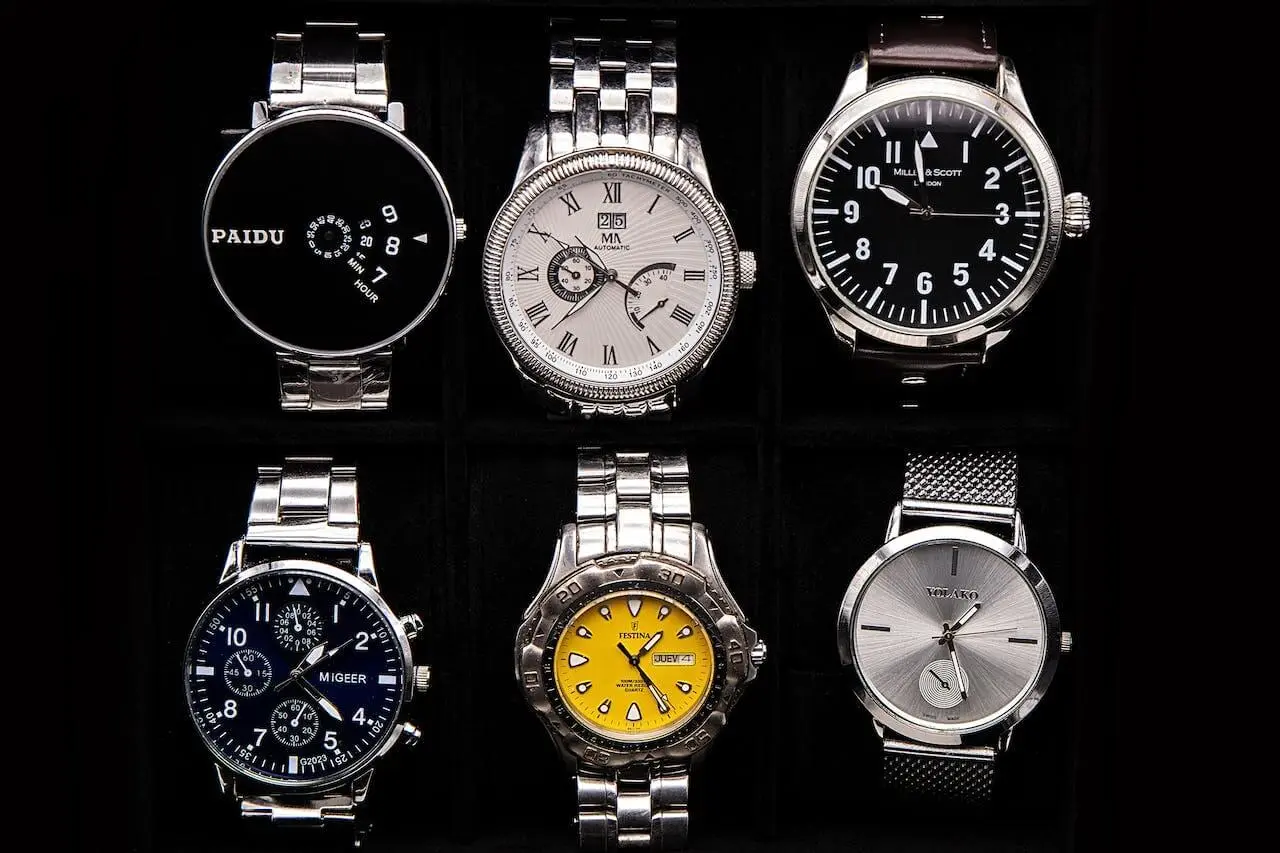Titanium VS Stainless Steel Watch – Which One is Better!

Choosing the perfect wrist companion goes beyond telling time – it’s about style, durability, and personal preference. Although deciding on which watch is good for me, Titanium Vs Stainless Steel Watch is a daunting process.
But before delving into other features, we would like to tell you the main difference between Titanium and Stainless Steel Watch that is:
“Think of titanium as stainless steel’s lighter and trendier sibling. It shares all the technical and physical perks but comes in at a feather-light 40% less. That’s why it’s the go-to for all sorts of watches – be it the rugged survival gear, those jet-setting GMT timepieces, reliable divers, or even the sleek automatic watches you’d wear to a fancy dinner.”
Hence, in the world of watches, two heavyweight contenders vie for your attention: Titanium or Stainless Steel. Let’s embark on a journey to uncover the nuances of these materials, exploring their unique qualities and helping you decide which one suits your wrist the best.
Table Overview: Titanium VS Stainless Steel Watch
| Specification | Titanium Watches | Stainless Steel Watches |
|---|---|---|
| Weight | Very Light | Substantial |
| Strength | Remarkable strength-to-weight ratio | Robust and Durable |
| Corrosion Resistance | Highly Resistant | Resistant |
| Aesthetic Appeal | Modern and Sleek | Classic and Timeless |
| Hypoallergenic | Yes | Generally Well-Tolerated |
| Sustainability | Excellent for Water Activities | Suitable for Water, but Heavier |
| Comfort | Lightweight and Comfortable | Heavier, Presence on the Wrist |
| Durability | Resilient to Scratches | Scratch-Resistant |
What’s a Titanium Watch?
When it comes to watches, titanium is a modern marvel. This lightweight metal boasts an impressive strength-to-weight ratio, making it a popular choice in the watchmaking realm. Titanium watches are not only durable but also offer a sleek and contemporary aesthetic. Let’s delve into the details of what makes titanium timepieces a standout in the world of horology.
What’s a Stainless Steel Watch?
Stainless steel has been a stalwart in the watch industry for its classic appeal and robust nature. But what sets stainless steel watches apart? From the manufacturing process to the final product, stainless steel watches embody durability and timeless style. Join us as we explore the characteristics that have made stainless steel a watchmaking staple.
Titanium VS Stainless Steel Watch: Features Overview
Built to Last: What lasts longer Stainless Steel or Titanium?
Stainless Steel
Picture this – a watch that can handle the daily grind with ease. Stainless steel is your go-to guy for durability. It’s tough, resistant to wear and tear, and won’t back down from the challenges of everyday life.
Titanium
Don’t let its lightweight demeanor fool you; titanium is a heavyweight in durability. It might not be as scratch-resistant as stainless steel, but it can take a beating and still look good. It’s like the silent superhero of the watch world.
Weighty Matters: Is Stainless Steel lighter than Titanium?
Stainless Steel
If you’re into watches that feel substantial on your wrist, stainless steel is your kind of material. It brings that satisfying heft that some watch enthusiasts crave. Hence, Stainless Steel can be a little bit weightier than Titanium.
Titanium
For those who want a watch that feels like a feather on their wrist, titanium is the way to go. It’s the lightweight champion, making it perfect for those who appreciate comfort during long hours of wear.
Battle Against the Element: Is Stainless Steel more corrosion-resistant than Titanium?
Stainless Steel
Stainless steel is like a superhero with a shield against corrosion. It laughs in the face of water and harsh environments, making it your trusty companion in all weather.
Titanium
Not to be outdone, titanium also boasts impressive resistance to corrosion. If your adventures involve water or salty breezes, a titanium watch won’t let you down.
Looks That Kill: Is Titanium More Classic Than Stainless Steel?
Stainless Steel
Classic, timeless, and versatile – stainless steel watches can shine bright or play it cool with a brushed finish. It’s the James Bond of watch materials.
Titanium
Imagine a watch with a modern, industrial vibe. That’s titanium for you. Its unique color and matte finish make it the rebel in the watch world.
Skin-Friendly Showdown: Which one is the Best: Titanium vs. Stainless Steel?
Stainless Steel
While stainless steel generally gets along with most skin types, some sensitive souls might feel a bit of irritation.
Titanium
Titanium takes the crown for being hypoallergenic. It’s a friendly option for those with skin that’s a bit finicky.
Pros and Cons of Titanium and Stainless Steel Watch
Pros of Titanium Watch
- Lightweight
- Modern Aesthetic
- Corrosion-Resistant
Cons of Titanium Watch
- Prone to scratches
- More challenging to manufacture
- Higher cost
Pros of Stainless Steel Watch
- Classic Appeal
- Durable
- Scratch-Resistant
Cons of Stainless Steel Watch
- Heavier
- May cause skin irritation for some
- May tarnish over time
Is Titanium or Stainless Steel Watch More Expensive?
These two alloys aren’t exactly hitting the jackpot in terms of value, but when it comes to processing, titanium takes the lead with higher costs compared to steel. Particularly in cold working, dealing with titanium can be a bit rough on the wallet.
The main culprit? Titanium’s toughness, which surpasses that of your regular steel. As a result, the tools involved in shaping and crafting it, like drills and cutters, take a beating and need replacing more frequently.
Now, let’s talk wrist bling. Ever wonder why watches seem to have a hefty price tag, especially those made from titanium? Well, here’s the scoop: those sleek titanium models are about 50% pricier than their steel counterparts.
Titanium Vs Stainless Steel Watch: Which One to Choose?
When it comes to the enduring debate between titanium and stainless steel, a lot of folks find themselves grappling with a crucial question—especially when it involves dive watches. Dive watches have really taken the spotlight in recent years, showing up not only on the glitzy red carpets of Hollywood but also delving into the profound depths of the ocean.
For those who actually take their dive watches underwater, the burning question is whether titanium or stainless steel is the superior companion in the deep blue sea. It’s not a cut-and-dry answer, unfortunately.
While stainless steel tends to be more resilient against salt damage, titanium holds its own ground quite impressively. The general consensus among enthusiasts is that the choice between a titanium or stainless steel dive watch ultimately boils down to the same factors as deciding which material suits your everyday wear preferences.
Weight often emerges as a significant deciding factor for many. So, whether you lean towards titanium or stainless steel, it’s a choice that resonates both with style and practical considerations.
Click here to find out about Qi-enabled devices.
To Sum Up
In the guide on Titanium VS Stainless Steel Watch, we’ve compared both the watches based on their design, price, look, quality, and others. You can also go through all the potential pros and cons of both the watches. In short, the final choice will be yours, because everyone has various preferences and needs, but our guide will help you a lot.






